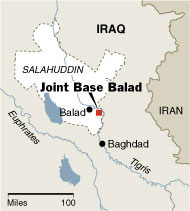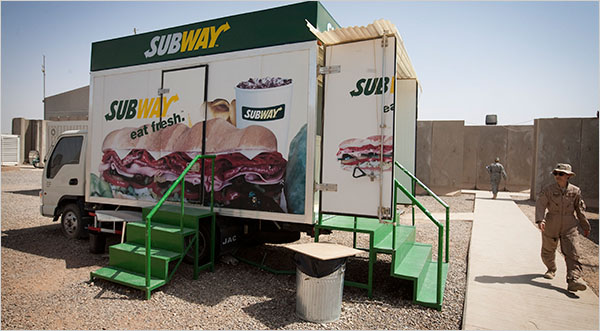Source: http://www.nytimes.com/2009/09/09/world/middleeast/09bases.html?_r=2&ref=middleeast
Big U.S. Bases Are Part of Iraq, but a World Apart
Johan Spanner for The New York Times. At the Subway at Joint Base Balad, workers from India and Bangladesh make sandwiches for American soldiers.
MARC SANTORA
Published: September 8, 2009
JOINT BASE BALAD, Iraq – It takes the masseuse, Mila from Kyrgyzstan, an hour to commute to work by bus on this sprawling American base. Her massage parlor is one of three on the base’s 6,300 acres and sits next to a Subway sandwich shop in a trailer, surrounded by blast walls, sand and rock.

The New York Times. Joint Base Balad is spread over 6,300 acres.
At the Subway, workers from India and Bangladesh make sandwiches for American soldiers looking for a taste of home. When the sandwich makers’ shifts end, the journey home takes them past a power plant, an ice-making plant, a sewage treatment center, a hospital and dozens of other facilities one would expect to find in a small city.
And in more than six years, that is what Americans have created here: cities in the sand.
With American troops moved out of Iraq’s cities and more than 100 bases across the country continuing to close or to be turned over to Iraq, the 130,000 American troops here will increasingly fall back to these larger bases.
While some are technically called camps or bases, they are commonly referred to as forward operating bases, or F.O.B.’s. The F.O.B. is so ingrained in the language of this war that soldiers who stayed mainly on base were once derisively called Fobbits by those outside the wire. But increasingly, the encampments are the way many Americans experience the war.
To be sure, thousands of Americans are with Iraqis at small bases, where they play an advisory role, and thousands more are on the roads and highways providing the protection needed to carry out the withdrawal.
But the F.O.B. has become an iconic part of the war, both for those fighting it and for the Iraqis, who have been largely kept out of them during the war.
They are in some ways a world apart from Iraq, with working lights, proper sanitation, clean streets and strictly observed rules and codes of conduct. Some bases have populations of more than 20,000, with thousands of contractors and third-country citizens to keep them running.
But the bases are also part of the Iraqi landscape. Mortar shells still occasionally fall inside the wire, and soldiers fall asleep to the constant sounds of helicopters, controlled detonations and gunfire from firing ranges.
“It is definitely a strange place,” said Capt. Brian Neese, an Air Force physician. “I’ve asked the Civil Affairs guy if there is anything that I can do off base, and there just isn’t anything for me to do. What kills is not the difficulty of the job but the monotony.”
At the height of the war, more than 300 bases were scattered across Iraq. Over the next few months, Americans hope to be at six huge bases, with 13 others being used for staging and preparing for a complete withdrawal.
The first people you encounter when driving up to an American base are not actually American. They are usually Ugandans, employed by a private security company, Triple Canopy, and those at Balad had enough authority to delay for five hours an American Air Force captain escorting an American reporter onto the base.
The Ugandans make up only one nationality of a diverse group of workers from developing nations who sustain life on the F.O.B.’s for American soldiers. The largest contingents come from the Philippines, Bangladesh and India. They live apart from both Western contractors and soldiers on base, interacting with them only as much as their jobs demand.
“Everyone stays pretty much separate,” said Mila, the massage therapist, whose last name could not be used out of security concerns. She has been in Iraq a year, but she said other workers had been here as long as six years, some never taking a break to go home. “You miss nature, trees and grass,” she said.
The base has two power plants, and two water treatment plants that purify 1.9 million gallons of water a day for showers and other uses. The water the soldiers drink comes from yet another plant, run by a bottling company, which provides seven million bottles of water a month for those on base.
Fifteen bus routes crisscross the complex, with 80 to 100 buses on the roads at any given moment. The Air Force officers who run the base have meetings to discuss road safety; with large, heavily armored vehicles competing for space with sedans, there are bound to be collisions.
There are two fire stations as well, and because Balad has the single busiest landing strip in the entire Defense Department, they can handle everything from an electrical fire in a trailer to a burning airplane.
The Americans also installed two sewage treatment plants, given how deeply troubled Iraq’s sewage system remains.
The facilities, like much in Iraq, are run by KBR, a company based in Houston. But as Americans prepare to turn bases over to Iraqis, they are working to bring in Iraqi companies to run some facilities, a process that has been slow and complex largely because of safety concerns.
One of the few places Iraqis can be seen, in fact, is the “Iraqi Free Zone,” a fenced-in area enclosed with barbed wire and blast walls. There, Iraqis sell pirated movies, discount cigarettes, electronics and Iraqi tchotchkes.
Each large base in Iraq takes on its own distinct flavor. Most large American bases were once Iraqi bases, but some, like Camp Bucca in southern Iraq near the Kuwaiti border, were created where there was only sand.
An Iraqi interpreter at Bucca who was living in Texas with his family when the war started said that when a contracting firm approached him, he asked where he would be working.
“They told me, ‘You would be going to a place called Bucca,’ ” said the interpreter, whose name the military asked not to be printed for security reasons. “I said, ‘There is no city called Bucca.’ They showed me it on the map and I said, ‘I am from Iraq and there is no city called Bucca.’ ”
It turned out that the interpreter was correct. Bucca, which would house the largest American-run prison in Iraq, was named after Ronald Bucca, a soldier with the 800th Military Police Brigade and a fire marshal in New York who was killed in the Sept. 11 attacks.
Entertainers come to American bases here, the most frequent being N.F.L. cheerleaders. When the Minnesota Vikings cheerleaders visited Bucca this spring, one could only wonder what the thousands of detainees, among them Muslim extremists for whom the flash of an ankle is cause for severe punishment, would have made of the spectacle less than a mile from their cells.

